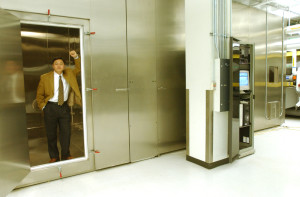 The Building Energy and Environmental Systems Laboratory (BEESL), Department of Mechanical and Aerospace Engineering, College of Engineering and Computer Science, is a key research lab associated with the SyracuseCoE. BEESL was established in November 1999 with funds from the U.S. Environmental Protection Agency, New York State Assembly, National Grid, and Syracuse University.
The Building Energy and Environmental Systems Laboratory (BEESL), Department of Mechanical and Aerospace Engineering, College of Engineering and Computer Science, is a key research lab associated with the SyracuseCoE. BEESL was established in November 1999 with funds from the U.S. Environmental Protection Agency, New York State Assembly, National Grid, and Syracuse University.
Mission
- Advance the science and develop innovative technologies in the areas of indoor environmental quality (IEQ), building energy efficiency (BEE) and building protections by conducting leading edge academic and industrial research.
- Enhance scholarly learning and professional training for graduate and undergraduate students via integration between research and teaching.
- Help relevant industries in product development and innovation by providing objective and unbiased product testing and evaluation services
Capabilities
BEESL has comprehensive expertise and state-of-the-art research facilities for both experimental and computational simulation studies, ranging from material level to full-scale system behavior and performance. Major research areas include:
Indoor Air Quality
- Source control: material emissions and indoor air quality (ME-IAQ)
- Ventilation (PV)
- Air Cleaning Technology(ACT)
Building Enclosure
- Material property measurements
- Hygrothermal performance of building enclosure assemblies (MBES)
- Couple heat, air, moisture and pollutant transport
Whole Building Energy And Environmental Systems
- Virtual Design Studio (VDS) for coordinated, integrated and optimized building system design
- Real-time monitoring and model predictive controls
- Intelligent Built Environmental Systems (i-BES)
Modeling And Simulations
- Combined Heat, Air, Moisture and Pollutant Simulation (CHAMPS)
- Computational fluid dynamics (CFD)
- Reduced-order models (CFD)
Indoor Environmental Quality And Human Performance
- Effect of ventilation and IAQ on productivity and creativity
- Effect of personal ventilation on perceived IAQ and thermal comfort
